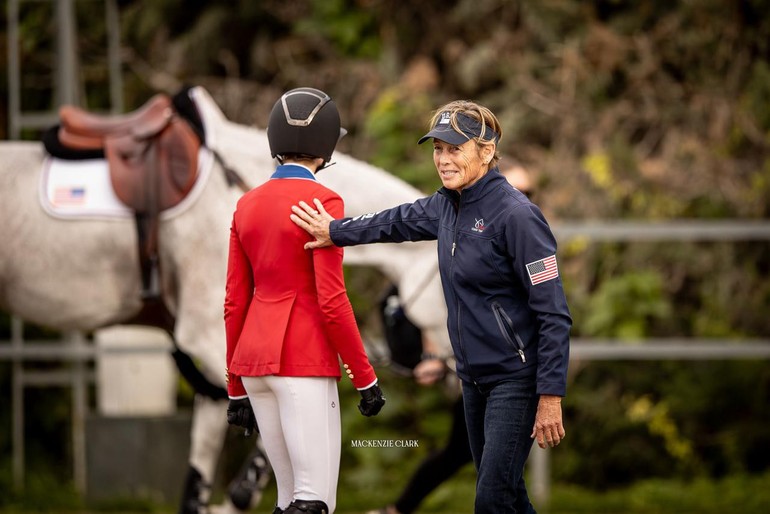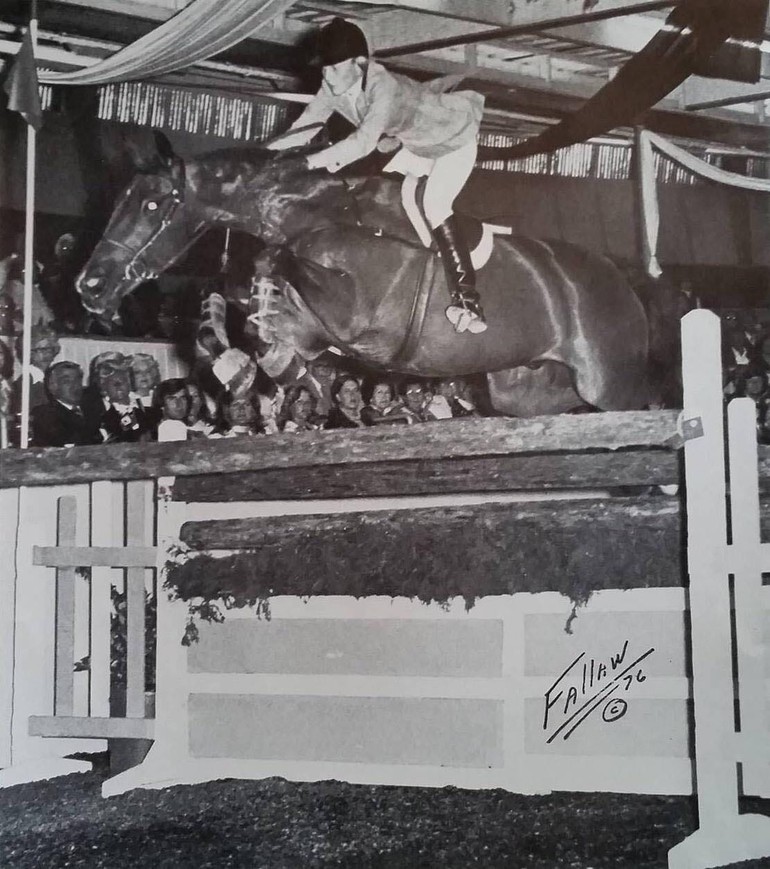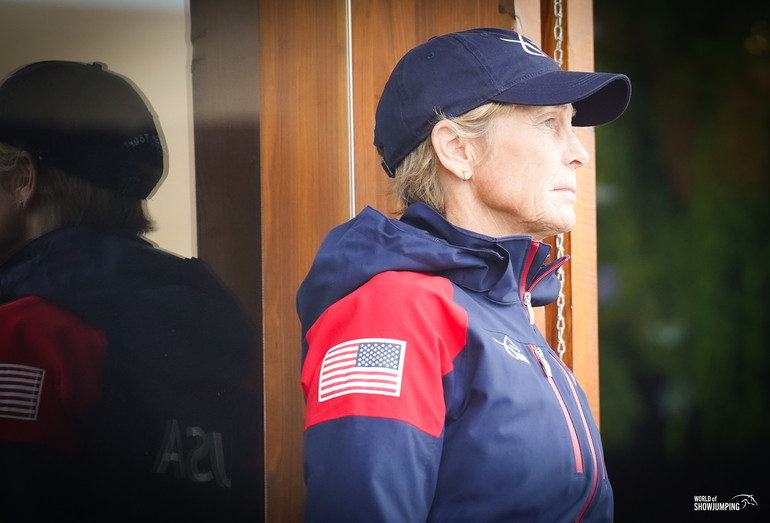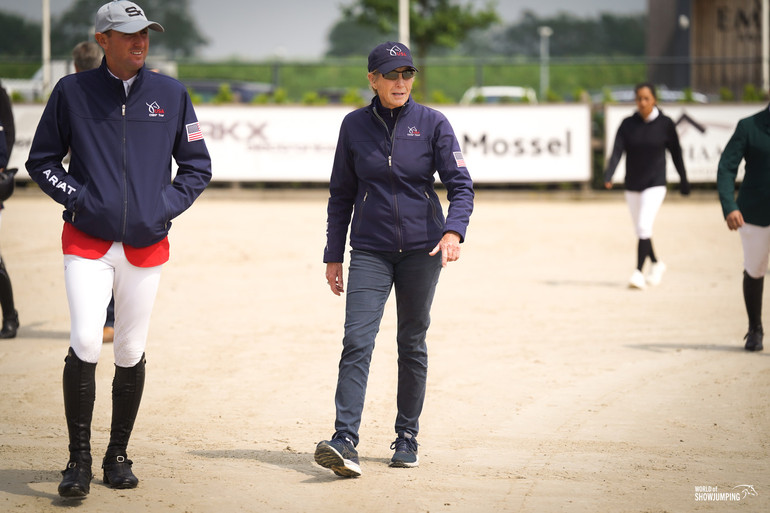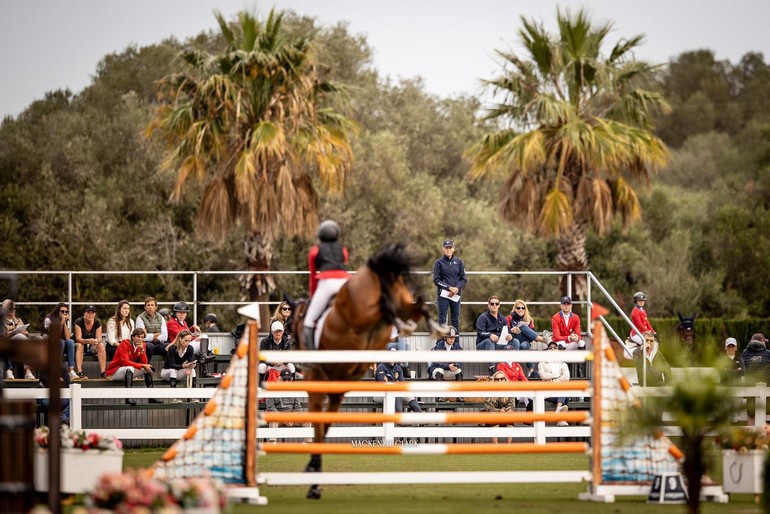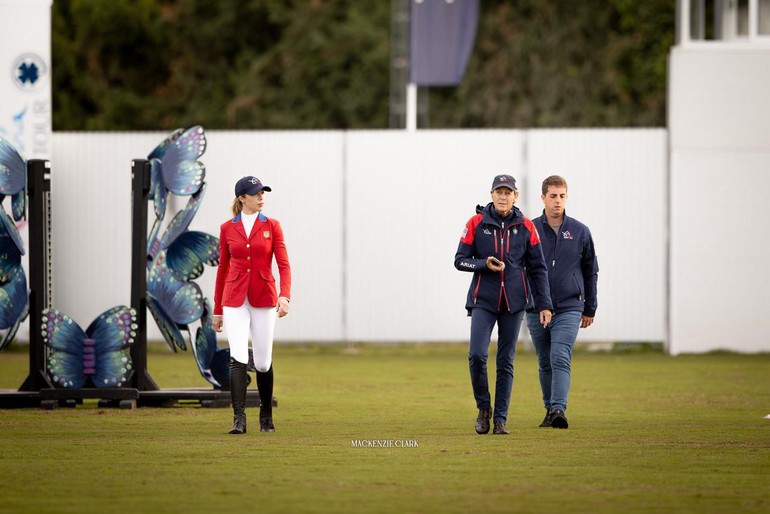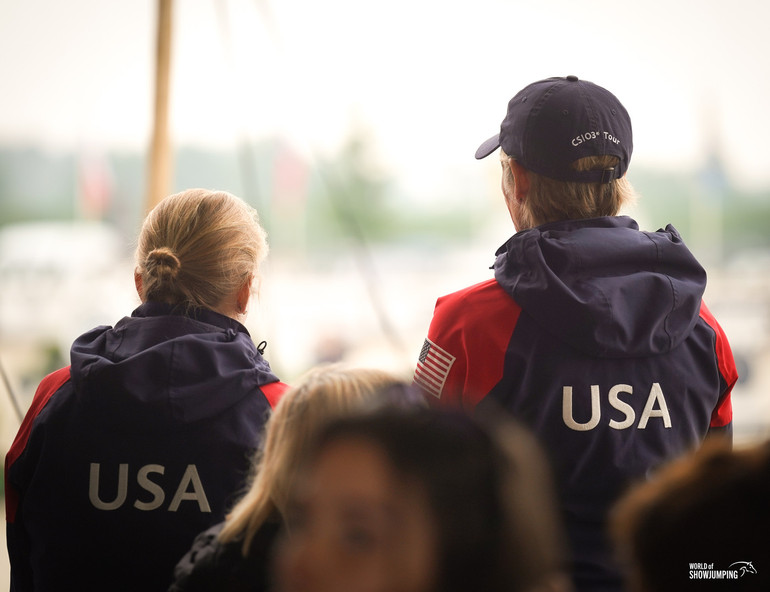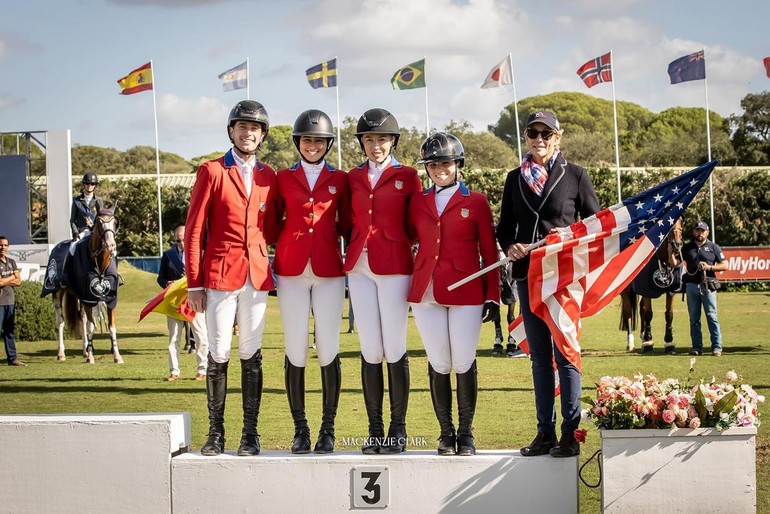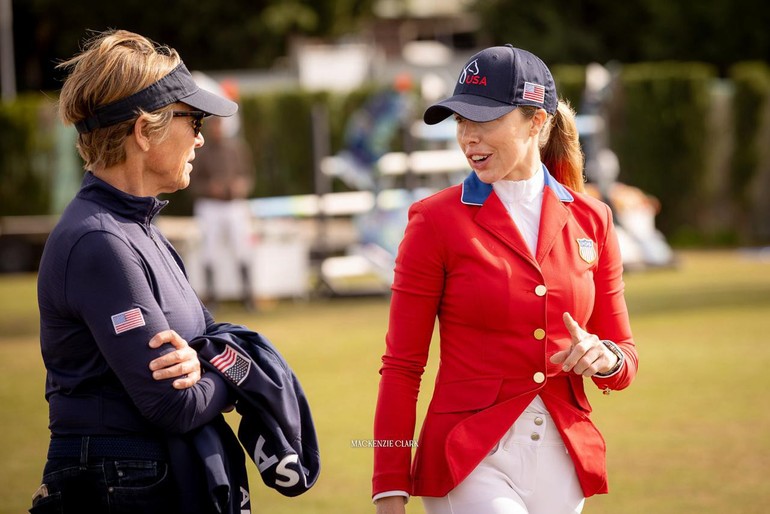Text © World of Showjumping
“I enjoy giving back to the sport I have always loved,” Anne Kursinski tells World of Showjumping. “I love to help people be better with their horses. When I'm teaching a clinic, I often say that I'm there more for the horses than the people; I'm giving the horses a voice.”
The now 65-year-old – who is based at her New Market Street facility in Frenchtown, New Jersey, USA – is a five-time Olympian with two team silver medals with the US squad. Anne also won individual and team gold at the Pan American Games in Caracas in 1983 and she was voted Female Equestrian Athlete of the year by the U.S. Olympic Committee in 1991. She has been to ten World Cup Finals and ridden on three World Equestrian Games teams. Today, Anne is the Chef d’Equipe to the US showjumping development program and a member of USHJA Board of Directors an Executive Committee.
“What I tell my students all the time is ‘follow your dreams’,” Anne tells. “What horses do for us and where they take us in our lives and in our careers – from the Olympics to different parts of the world – is incredible. We should never lose sight of how much they give us. Our sport has become a big business, but I still believe that at the core of it all is the connection you as a rider build with your horse. I never did it for the money. I just tried to find another horse, another opportunity to learn.”
Just a girl that loved to ride
“There were ups and downs in my career, but I never gave up; I had a passion,” Anne tells about her long and hugely successful career in the saddle. “I was just a girl that loved to ride. I started at a riding club in California when I was four. I did equitation, hunters, junior jumpers and all those things. Since I was young, I had a desire to go to the Olympics. I would look at the old picture books, mostly black and white, with the likes of William Steinkraus, Hans-Günter Winkler and Kathy Kusner and dream about riding and competing internationally.”
There were ups and downs in my career, but I never gave up; I had a passion
In 1976, when Anne was still in high school, she got to be part of the US team at Spruce Meadows. “Seeing jumping like that – which was totally different than what I was used to in California – was an amazing experience,” she recalls. “From there on, I was sure I wanted to ride internationally. That was when I knew for real.”
Five-time Olympian
Anne’s childhood dreams of the Olympic Games came true – in five-fold. “I tell the kids today how for them it is all about the Olympics in Los Angeles in 2028, but for me it was Los Angeles 1984,” she smiles. “When I started to work with George Morris on the East Coast in 1981, he told me that if I really wanted to try to go to the Olympics in ’84, I would need to find a good horse. A group of people from the riding club where I was, including my family, bought Livius from Emile Hendrix. Livius had won the European Championship and was a great horse. I was a young girl from California, and at the time, it was a lot of money that this syndicate used to buy Livius. He ended up being a horse that taught me so much.”
Everything is a learning experience
Prior to the Olympic Games in Los Angeles, Anne competed at the 1983 World Cup Final. “George told me that it was important to do the Final and the Pan American Games to gain experience ahead of the Olympics. I won two gold medals at the Pan American Games in Caracas, both team and individual as well as the Grand Prix of Rome as the first American to do so. A year later, we made the Olympic team, but ended up being the alternate pair. I was the youngest and the team won gold. Being a part of that experience only added fuel to my fire. I learned so much from being there, and that is another point I like to tell the kids; everything is a learning experience.”
At the 1988 Olympic Games in Seoul, Anne competed with Starman – taking team silver and ending up fourth individually. In Barcelona in 1992, riding Cannonball, Anne and the U.S. team ended up fifth. In Atlanta in 1996, it was Eros that was Anne’s Olympic partner. “Eros was a horse of a lifetime for me,” she tells. “I would say Eros and Starman were the best horses I had during my career. I got Eros as a 5-year-old and come Atlanta, he was nine and had enough mileage. We had jumped in Europe on different teams and we ended up winning another team silver. Eros was a skinny, high-headed, hot thoroughbred, who many U.S. riders had tried before me. I grew up on thoroughbreds in California and once I sat on him, I immediately thought that this horse could go to the Olympics. It was just one of those things that were meant to be, because many top riders had tried him and for one reason or another passed on him.”
Money was never the focus
Throughout her riding career, Anne kept her business at home going by teaching a lot and selling a little. “My career always came first,” she explains. “Maybe I should have sold more horses, made more money, but that was never my focus. I always tried to find another great horse and I was lucky to have great owners that supported me. I worked with some hunters, some equitation and some three-day eventers. I coached other Grand Prix riders, amateurs and helped junior riders come along. I have worked with some international riders also, such as Eugenio Garza, Karen Polle, Susanne Bond and Kamal Bahamdan at the beginning of his career. However, most of my students have been junior, amateur and jumper riders at home.”
The journey with every horse is what I love the most
“I had great teachers and mentors during my riding career, and I am now trying to give back what I have learned,” she continues. “My first love for sure is riding and the horses. What makes them tick and how to make them their best, not just the winning, is what I find fascinating. I won enough – I can't complain – but the journey with every horse is what I love the most. That is something I am trying to teach the kids. When I'm in the Chef d’Equipe role, they have their own trainers, but I still emphasize the horsemanship aspect of the sport. That's what I love most about the sport; the horse.”
Riding and competing are a reflection of life
In her role as the Chef d’Equipe to the US showjumping development program, Anne is happy to share her knowledge with the next generation. “From falling off at the World Cup Final in my debut with Livius, I guess I have done it all,” she smiles. “It was a packed house at Scandinavium in Gothenburg, and I was a young girl from California on this famous horse – because Livius was well-known in Europe. He stopped at the liverpool, I fell off and I had to lead him out of the ring. I remember thinking how I would never be able to compete again, that I would never make a team. Now I can tell the kids that I went on to do five Olympics. I had good horses; lame horses; gold medals; I won and I lost. I enjoy sharing my experience with the next generation, and whoever is willing to learn. I’m trying to help them understand how the sport works. Not that I know everything by any means, but I have a lot of experience and hopefully sharing that is helpful to others.”
I try to put myself in the horses’ shoes: What is the horse feeling and thinking?
“Riding and competing are a reflection of life,” Anne points out. “It isn't always easy – and you can ask any top rider, everyone has had setbacks. You might make it on a team, but then your horse goes lame and you don't get to go. Being able to stay focused and calm is essential and that comes with age and experience. In my chef role now, when it doesn't go well, I can look at it from a much bigger perspective. I do think I'm a pretty good chef because I can put myself in my riders’ shoes. And more importantly, I try to put myself in the horses’ shoes: What is the horse feeling and thinking?”
There are all these ebbs and flows, and that's the beauty of our sport for me
“It is not only about dealing with the setbacks, either,” Anne continues. “You can be on a winning roll – that's a whole other thing to cope with. I won the Grand Prix of Rome and two gold medals at the Pan American Games in 1983 and the let-down after that was huge. One moment you are on top and the next you go back to the regular horse shows and other horses, and you're not winning anything. There are all these ebbs and flows, and that's the beauty of our sport for me. It's a long-term sport and we are so lucky to be in such a different position than gymnasts or some of the track and field athletes whose careers are quickly over. Being mentally strong, following your passion, finding the next horse, aiming for the next goal – it is about having that resilience and being patient. I always had that feeling of moving forward and learning, all the time.”
You have to be able to take the toughness, the ups and downs
“I try to inspire people to be resilient. However, if someone really wants to give up, that’s fine. If that's the attitude, then they shouldn't be in this sport. There are loads of people that were told they couldn't do it, including myself. For years, I was told that I would never make it, that I will never be good enough. I was at my second Olympic Games before I thought I was any good, and I even today, I work on being better. In this sport, there is always more to learn, and we can continue to learn and grow. I believe that there are no failures, just feedback. When you lose, don't lose the lesson. It's a sport, and you have to be able to take the toughness, the ups and downs – and ultimately, that's life. It’s a great sport because you get all of life's lessons; winning, losing, celebrating and rebuilding.”
The ultimate goal
“The connection with the horse is the ultimate goal,” Anne continues to explain about her approach to riding. “No matter what level the horses end up going, the feeling and the connection, the bond you create with them is ultimately all that matters. The journey with the horses is the fun part of the sport and to me, getting to know them is the most interesting aspect. With my kids, I talk about the “feeling” when I teach: As a rider, you should get inside the horse, not on top of the horse. And that's where your work with the vet, the blacksmith and your support team comes in. At the end of the day, it's your horse and you as a rider get their feedback first-hand.”
“I feel blessed and thankful for the fact that I have had great grooms, vets and blacksmiths all my career. They have helped me understand my horses better. Horses are not just a mechanical bike that you get on. What separates the top riders really is the feeling they have for their horses. I love coming to Europe where at some of the shows you can see the top riders driving their own horse trucks. You don't see that much in the US.”
The horses tell you if you really listen to them
“Unfortunately, what I see sometimes with the younger generation is that when a horse doesn't go well, it is considered rubbish and they get another one. When I was growing up, I had to focus on making each horse better, never getting rid of them,” Anne says. “Sometimes, you have to try many things before it clicks, and not all horses fit in a certain system.”
“This generation wants everything quickly; it is about how fast they can get it. They are going to the next trainer, getting the next horse, getting the next thing. And sure enough, sometimes there is a time for change, but I've always been a little old fashioned,” Anne points out. “The horses tell you if you really listen to them. It's almost intangible to say exactly what it is, that feeling, that connection. I always keep going back to the love of the horse, which might sound corny, but it's the truth. The sign of a great rider is a happy horse. It is not just that you're winning, but that your horse is happy while doing it. The connection and understanding the horse through and through should be the aim, not any result.”
You make your own success by being hungry
“I didn't have all the money and many of the top riders today weren't born with a silver spoon,” Anne says. “Is it helpful to have money? For sure. However, I still believe that if you're a hard worker, people will notice and you will get opportunities. You have to work and learn, and sometimes it can mean starting by being a groom. When you are at home, be in the barn and see what's going on, don’t just show up to ride. You make your own success by being hungry and fighting for it – and our sport is not a quick fix, unlike today's mentality. It is a life long journey.”
When you are at home, be in the barn and see what's going on, don’t just show up to ride
“Great things can happen if you work hard and love your horses. First of all, learn how to take the best care of your horses – because they're your partners. To me, there are no shortcuts in our sport. You need the deeper connection with your horse and you need to know what is going on behind the scenes. The truly great ones are involved in every aspect of their horses’ life. It’s the feed, shoeing, vet work, fitness, tack, shipping, the flatwork, jumping and showing.”
The truly great ones are involved in every aspect of their horses’ life
“Hard work and fighting spirit, that is what you need when you get to the championships,” Anne continues. “That's what you need when you are at the Olympics; the ability to fight. In there, you're really fighting for your country to win, and you've got to have that spirit in you. It's not just about looking pretty or doing the numbers that the coach told you to do around the course. The top riders aren't counting on getting lucky; they are in there focused, riding every step, fighting for it. And it is the same fight you have to use in the scrappiness of trying to find the next horse, making ends meet. In my role as a chef, seeing the young riders, I always consider how can I help them find an owner, find a better horse. I don’t want anyone to give up because they feel like they don't have the money.”
Learning to be better for our horses
Anne believes that attitude is more important than economics when it comes to being a good horseperson. “You can have principles that you believe in, but I think it's very important to be coachable,” she points out. “In life, a growth mindset is essential. I'm still trying to learn, I’m still curious – and the sport keeps evolving. How can I keep improving myself on a personal level? Also, try to not take it personally when someone tries to help you. Sometimes I'm strict in my clinics and in my teaching, but I feel it’s clear communication, like the clear, consistent communication your horse needs. Sometimes I say ‘I've got to say this strongly because your horse needs you to hear this.’ To be a receptive, good student, you have to listen, not only to your coach but to your horse as well. Working on your riding skills means trying to be better for your horse. Building a partnership between you and your horse is going to make you successful. That is truly why we work on position, balance and control; to be better partners for our horses.”
Working on your riding skills means trying to be better for your horse
However, when it comes to being coachable, it is important to respect healthy boundaries. “In all aspects of safe sport, as a coach you have to be mindful of how you express yourself,” Anne explains. “You have to get the point across in a positive, healthy way. We live in a different time now; that's not the way I was taught. We were told all kinds of things growing up. As a rider, if you don't feel comfortable in a situation, speak up. If I felt someone was being too strong or abusive with their horse, for sure I'm going to speak up – and people should do that if necessary. You have to be strong and assertive enough to take care of yourself and your horse. I'm the first person to say, speak up – I learned the hard way. Sometimes, getting a third party involved can help. Everybody is different; just like horses, some people are more sensitive than others and that's OK, there isn't just one way to be. You have to know each horse and each person, and respect their sensitivity levels.”
The importance of Nations Cups
Part of Anne’s job as Chef d’Equipe is to get the next generation motivated. “We have a lot of talent and some great horses in the US,” she says. “Getting them on the Nations Cup teams in Europe to gain more experience is essential. In my opinion, if you want to be a top professional rider, you have to come to Europe. At home our shows have gotten better, and we have more four and five-star shows, but I believe that is not enough.”
Riders need to understand the difference of a Grand Prix, a Nations Cup and a championship
“However, another issue we have had is getting invitations to these Nations Cups. With the new Longines League of Nations, the numbers are made even smaller. Trying to get invitations even to the three-star Nations Cups has been difficult for us. Everybody needs more Nations Cup experience, especially countries that don't have that at home. In Europe, you have Nations Cups for all age levels, from ponies to children and juniors – we don't have that in the US.”
“When you are getting ready for a championship, you have got to understand how fit you need your horse to be, how your horse responds to jumping multiple rounds,” Anne continues to explain about the importance of Nations Cups. “Just jumping the Grand Prix every week does not prepare you for that. Riders need to understand the difference of a Grand Prix, a Nations Cup and a championship. And when it comes to fitness, each horse is different; some need to jump more and some less. It comes down to knowing your horse, along with knowing your fitness and mental game for a two round Nations Cup or a week-long championship. The success the likes of McLain, Laura and Kent have had did not just happen overnight; they've been doing this for years, competing and getting experience, developing their systems and now we are working on the next group to come.”
Keep the love of the horse as the guide
“I guess it is a balancing act,” Anne says about the future. “I wish we got more exposure for equestrian sports on the global stage. It would be fabulous for the sport, but we should not do it at the detriment of the horses or the people involved. I'm going to keep trying to make our sport good and wonderful, keep the basics and the love of the horse. It's still alive in me and I want to share that with others. That's why I want to help; it is the magic of the horse that keeps me going.”
We have to ensure that we keep the love of the horse as our guide, and that part of our sport alive
“In part, the increase of money in the sport is a good thing. When I started, it wasn’t like this at all. These days, to really pick and choose where you show is difficult. However, we have a responsibility towards the horse to use good judgment, and to me, the horse always come first, both in training and in competition. Everybody has their own motives, so we cannot really tell other people what to do. What makes this discussion complicated is the fact that horses generally will go and do whatever we ask of them; that's their character, it is their nature. Having more money and more competitions is good for the sport, but we have to be very cautious of the affect it has on the horses, and even all the people involved. There is this constant pressure and it does affect all of us, you do feel it. Maybe some regulation is needed to protect horses from being over-shown, because the human nature is greedy, we want more and more. I think it is a concern in the sport today.”
“We cannot keep pushing, pushing and pushing,” Anne concludes. “We have to ensure that we keep the love of the horse as our guide, and that part of our sport alive. That's the beauty of our sport; the animal, the horse, and we should never lose sight of that.”
1.7.2024 No reproduction of any of the content in this article will be accepted without a written permission, all rights reserved © World of Showjumping.com. If copyright violations occur, a penalty fee will apply.



